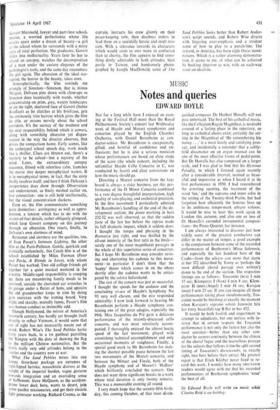Notes and queries
MUSIC
EDWARD BOYLE
Not for a long while have I enjoyed an even- ing at the Festival Hall more than the Royal Philharmonic Society's concert last Wednesday week of Haydn and Mozart symphonies and concertos played by the English Chamber Orchestra, with Daniel Barenboim as con- ductor-soloist. Mr Barenboim is exceptionally gifted, and brimful of confidence and en- thusiasm; but he is also a serious musician whose performances are based on close study of the score (the whole concert, including the unfamiliar Haydn Cello Concerto in C, was conducted by heart) and clear convictions on how the music should go.
. Directing a Mozart concerto from the key- board is always a risky business, yet this per- formance of the D Minor Concerto combined to a rare degree thoughtful interpretation, high quality of solo-playing, and orchestral precision.
In the first movement I particularly admired
Mr Barenboim's handling of the end of the de- velopment section; the piano marking in bars
232-52 was well observed, so that the sudden
forte of the last bar before the reprise made its full dramatic impact, which it seldom does.
I thought the tempo and phrasing in the
Romanza just right, and was thrilled by the all-out intensity of the first tutti in the finale—
surely one of the most magnificent passages in the whole of this superlative series of concertos. But I hope Mr Barenboim may consider revis- ing and shortening his cadenza to this move- ment—in particular I don't think that the 'happy' theme which comes in on the oboes shortly after the cadenza wants to be antici- pated by the soloist beforehand.
The rest of the concert was just as successful. I thought the speeds for the andante and the concluding vivace of Haydn's Symphony No 95 very well chosen, and the ECO responded admirably; I now look forward to hearing Mr
Barenboim perform a Haydn symphony con- taining one of the great adagios, especially the 99th. Miss Jacqueline du Pre gave a delicious performance of the recently-discussed cello concerto, and was most sensitively accom- panied. I thoroughly enjoyed the almost hectic speed of the last movement, played with astonishing technical accomplishment and only occasional moments of roughness. Finally, a special good mark to Mr Barenboim for mak- ing the shortest possible pause between the last two movements of the Mozart concerto, and between the Minuet and Finale, both of the Haydn symphony and of Mozart's 'Haffner' which brilliantly concluded the concert. One does not want three significant breaks in a work whose total duration is only twenty minutes. This was a memorable evening all round.
I very much hope that the seventy-fifth birth- day, this coming October, of that most distin-
guished composer Dr Herbert Howells will not pass unnoticed. The best of his cathedral music, like the Collegi um Regale Magnificat, is no doubt assured of a lasting place in the repertory, so long as cathedral choirs exist; certainly the set- ting in the Magnificat of 'He remembering his mercy ...' is a most lovely and satisfying pass-
age, and incidentally a reminder that a softly- held dissonance on an organ manual can be one of the most effective forms of pedal-point. But Dr Howells has also composed on a larger scale, and I was glad to find that his Hymnus Paradisi, to which I listened again recently after a considerable interval, seemed as beau- tiful and impressive as when I heard it at its first performance in 1950. I had remembered the arresting opening, the treatment of the word lux,' and the soprano and tenor solos in the setting of the Twenty-third Psalm, but had forgotten how efficiently the Sanctus lives up to its ambitious tempo-mark allegro volante. It would be nice to hear this work again in London this autumn, and also one or two of Dr Howells's extended instrumental composi- tions—the Piano Quartet, for instance.
I am always interested to discover just how widely some of the greatest conductors can differ in the matter of tempo; a good example is the comparison between some of the recorded performances of Beethoven's Missa Solemn's, and especially the last hundred bars of the Credo—from the allegro con moto that starts at bar 372 (described by Tovey as 'perhaps the most difficult choral passage ever written') down to the end of the section. The respective timings are as follows: Toscanini (acA) 3 min 37 sec; Klemperer I (Vox) 4 min 8 sec; Klem- perer II (nmv/Angel) 5 min 18 sec; Karajan (ma) 5 min 23 sec. If one can imagine all these performances taking place simultaneously, Tos- canini would be finishing at exactly the moment when Karajan's soprano soloist Janowitz hits her (very beautiful) top B flat in bar 452.
It would be both foolish and impertinent to attempt to adjudicate, but one notices with in- terest that in certain respects the Toscanini performance is not only the fastest but also the most sensitive—better than any other con- ductor he secures continuity between the climax of the choral fugue and the marvellous passage for the soloists that follows it (NB the split second timing of Toscanini's decrescendo, so exactly right, two bars before their entry). My greatest regret is that Erich Kleiber never lived to re- cord this work; I wonder how many SPECTATOR readers would agree with me that his recorded performances of Beethoven symphonies 'wear' the best of all.
Sir Edward Boyle will write on music while Charles Reid is on holiday.






























 Previous page
Previous page